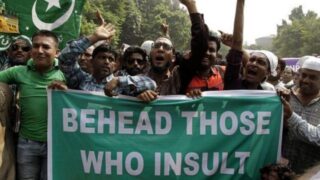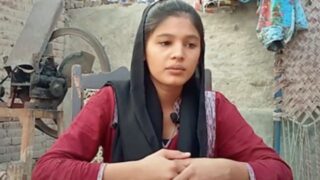In 2016 and 2017, TLYRA and the political party it created proved their ability to paralyze the country through mass protests with an anti-minorities agenda.
by Massimo Introvigne
Article 4 of 7. Read article 1, article 2, and article 3.


In the previous article, we identified the movement to prevent the execution of Mumtaz Qadri, the Barelvi who assassinated Punjab governor Salman Taseer because of the latter’s support for Asia Bibi, a Christian woman sentenced to death for blasphemy, as the origin of the party Tehreek-e-Labbaik Pakistan, which was formed as the political arm of the Barelvi pro-Qadri organization Tehreek-e-Labbaik-ya-Rasool-Allah (TLYRA), founded in 2013.
After Qadri was executed on February 29, 2016, his supporters observed the traditional forty days of mourning. They also claimed that February 29 had been chosen by the government as the execution date to prevent a yearly celebration of the anniversary.


The forty days of mourning end with the chelum, the fortieth day, in which a ceremony commemorates the deceased. The chelum of Mumtaz Qadri was celebrated by a rally organized by TLYRA in Rawalpindi. It was attended by some 25,000 Barelvi, 10,000 of whom marched to Islamabad, entered the red zone where protests are forbidden, torched a station and destroyed cars in the process, and started a sit-in before the Parliament.
The protesters, some of whom carried weapons, stated they would not leave until the government would open a dialogue on their requests: sharia should be imposed; Mumtaz Qadri should be officially honored as a martyr; non-Muslim NGOs should be banned from the country; blasphemy law should be kept in perpetuity; Islamic religious leaders and clerics jailed on charges of sedition or terrorism should be released; all Ahmadis and non-Muslims should be removed from government positions; Asia Bibi should be immediately executed.
Riots erupted in other parts of Pakistan as well, and Barelvi militants started what will become the trademark strategy of Tehreek-e-Labbaik Pakistan, blocking the highways and paralyzing the country’s traffic. The army was called in to disperse the protesters, but they resisted, and it became clear that a more decisive military intervention would lead to a bloodbath. Finally, the government met with TLYRA representatives and signed a seven-point memorandum with them. Although none of their original demands had been accepted, TLYRA hailed the fact that the government had to negotiate with them as a victory.
The leader of TLYRA was Khadim Husain Rizvi (1966–2020), who had emerged as the most popular and incendiary speaker in the years of the pro-Qadri movement, despite being on a wheelchair since 2009, when he had been involved in a car accident.


Rizvi was a Barelvi cleric and preacher, who worked at the state administration of religion Auqaf until he had to resign because of his militant activities. He was later regarded as a Pir and venerated as a saint after his death. However, he was not originally part of the inner circle of the Barelvi senior Pir. Some of the latter resented his popularity, and the fact that TLYRA and Tehreek-e-Labbaik Pakistan, which Rizvi incorporated in 2017, openly stated that they were independent lay organizations not submitted to the direction of the Pir. However, one senior Pir, Muhammad Afzal Qadri, became an important leader of Tehreek-e-Labbaik Pakistan.
The latent tension between the more traditional Pir and Rizvi explains the factionalism in Tehreek-e-Labbaik Pakistan, and the fact that in general elections it was able to gather only a fraction of the Barelvi vote. Internal problems first emerged in November 2017, when TLYRA and Tehreek-e-Labbaik Pakistan organized a second mass sit-in in Islamabad, this time after a “long march” from Lahore.
The protesters asked for the resignation of Minister of Justice Zahid Ahmid, who was accused of being soft on the Ahmadi issue and of preparing a law that would make it possible for Ahmadis to be elected to the Pakistani Parliament. Protests were also organized in other cities. In Islamabad, there were violent clashes with the police, and four police officers and two protesters died.


This time, Tehreek-e-Labbaik Pakistan won, as the Minister resigned and an agreement brokered by the Army ended the protests. However, one senior leader of the party, Muslim scholar Ashraf Asif Jalali, did not accept the agreement, claiming that it should have included the official rehabilitation of Mumtaz Qadri and other Barelvi “martyrs,” and it didn’t. Jalali continued protests in Lahore without the support of Rizvi and eventually left Tehreek-e-Labbaik Pakistan and continued with its own splinter organization.
He also claimed he had been the main founder of TLYRA rather than Rizvi. Ironically, Jalali was arrested in 2020, after having been accused of blasphemy himself for having offended the honor of Prophet Muhammad’s daughter, Fatimah, who was the wife of Ali, recognized by the Shiites as their first Imam, as part of his vitriolic anti-Shia controversy.


Another controversy opposed before the 2018 general elections Tehreek-e-Labbaik Pakistan and a political organization formed by some leading Barelvi Pir and arguing that one single demand, imposing in Pakistan the rule of sharia as interpreted by Barelvi, Nizam-e-Mustafa, should be at the center of Barelvi’s political agenda. The organization, Nizam-e-Mustafa Muttahida Maha, never really succeeded but was seen as a tool used by conservative Pir to undermine Rizvi and Tehreek-e-Labbaik Pakistan.
In a way, the move succeeded, as at the general elections of July 25, 2018, Tehreek-e-Labbaik Pakistan gathered 2,234,316 votes, or 4.21%, which demonstrated that it had not succeeded in attracting a majority of the Barelvi voters. The percentage did not allow the party to be represented in the National Assembly, although it won seats in the Sindh Provincial Assembly. On the other hand, those who regarded Tehreek-e-Labbaik Pakistan as an extremist organization involved in anti-state violence now had to recognize that millions supported it.









